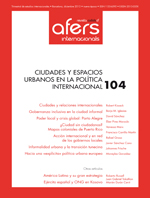South America and its grand strategy: between acquiescence and autonomy
Keywords:
Latin America, grand strategy, power, foreign policy, acquiescence, autonomyAbstract
Revista CIDOB d’Afers Internacionals, nº 104
Quadrimestral (September-December 2013)
ISSN:1133-6595 | E-ISSN:2013-035X
This essay introduces the issue of grand strategy, and its place and practice in Latin America. This subject, crucial to world politics, has been and continues to be a source of intense, interesting conceptual debate, as well as an essential point of reference for drafting initiatives and official policy guidelines in the central countries. In Latin America, grand strategy has been conceived and implemented in a unique fashion. It has manifested itself through two rationales: acquiescence and autonomy. In addition, it has been expressed through two phenomena: the existence of «small grand strategies» and the emergence of a more conventional first grand strategy, such as the one currently being deployed in Brazil. After identifying four specific historical periods in which a Latin American grand strategy has taken place, and enumerating the options deployed by the countries in the region, the essay concludes with a conceptual examination.
>> The full text articles of this issue are available only in Spanish language
References
Arauz, Celestino Andrés y Pizzurno, Patricia. Un siglo de relaciones entre Panamá y los Estados Unidos. 1903-2003. Tomo I. Panamá: Editorial Libertad Ciudadana y Comisión Universitaria del Centenario de la República de Panamá, 2003.
Barria, Juan Aníbal. «Chile y la seguridad humana», en: Rojas Aravena, Francisco y Goucha, Moufida (eds.). Seguridad humana, prevención de conflictos y paz en América Latina y el Caribe. Santiago: FLACSO/UNESCO, 2002.
Berrios, Rubén y Blasier, Cole. «Peru and the Soviet Union (1969-1989): Distant Partners». Journal of Latin American Studies, vol. 23, n.º 2 (mayo 1991).
Bizzozero, Lincoln. «Uruguay: A Small Country Faces Global Challenges», en: Mora, Frank O. y Hey, Jeanne A. K. (eds.). Latin American and Caribbean Foreign Policy. Lanham: Rowman & Littlefield Publishers, 2003, p. 330.
Bonilla, Adrian. «Alcances de la autonomía y de la hegemonía en la política exterior ecuatoriana», en: Bonilla, Adrián (ed.). Orfeo en el infierno: una agenda de política exterior ecuatoriana. Quito: FLACSO, 2002.
Brands, Hal. The Promise and Pitfalls of Grand Strategy. Carlisle Barracks: U.S. Army War College, 2012. (en línea) [Fecha de consulta 27.05.2013]: http://www.strategicstudiesinstitute.army.mil/pdffiles/PUB1121.pdf
– Dilemmas of Brazilian Grand Strategy. Strategic Studies Institute Monograph, agosto 2010.
Briceño Monzón, Claudio Alberto. «La política exterior de Venezuela en los tiempos del socialismo del siglo XXI: entre la autonomía y la subordinación al capitalismo global». Cuadernos de Relaciones Internacionales, Regionalismo y Desarrollo, vol. 6, n.º 12 (julio-diciembre 2011).
Brooks, Stephen G. et al. «Don’t Come Home, America: The Case against Retrenchment». International Security, vol. 37, n.º 3, I (invierno 2012/2013).
Brysk, Alison. «Global Good Samaritans? Human Rights Foreign Policy in Costa Rica». Global Governance: A Review of Multilateralism and International Organizations, vol. 11, n.º 4 (octubre 2005).
Burns, E. Bradford. The Unwritten Alliance: Rio-Branco and Brazilian-American Relations. New York: Columbia University Press, 1966.
Christensen, Thomas J. Useful Adversaries: Grand Strategy, Domestic Mobilization, and Sino-American Conflict, 1947-1958. Princeton: Princeton University Press, 1996.
Corrales, Javier. «Using Social Power to Balance Soft Power: Venezuela’s Foreign Policy». The Washington Quarterly, vol. 32, n.º 4 (2009).
Da Silva, Aléssio Oliveira. «Brasil: La gran estrategia de un país-continente». Boletín de Información Centro de Estudios de la Defensa Nacional, n.º 299 (2007).
De Almeida, Paulo Roberto. «Uma grande estratégia para o Brasil: Elementos propositivos». [Fecha de consulta: 30.05.2013]: http://www.pralmeida.org/05DocsPRA/2418GrandeEstrategiaBrasil.pdf
Domínguez, Jorge et al., «Boundary Disputes in Latin America». USIP Peacework Series, n.º 50 (septiembre 2003).
Drekonja Kornat, Gerhard. Colombia. Política exterior. Bogotá: La Editora/FESCOL/Universidad de los Andes, 1982.
Falk, Pamela S. «Cuba in Africa». Foreign Affairs, vol. 65, n.º 5 (1987).
Feinsilver Julie. Healing the Masses: Cuban Health Politics at Home and Abroad. Berkeley: University of California Press, 1993.
Fonseca, Gelson Jr. A legitimidade e outras questoes internacionais. Sao Paulo: Editora Paz e Terra, 1998.
Gaddis, John Lewis. Strategies of Containment: A Critical Appraisal of Postwar American National Security Policy. New York: Oxford University Press, 1982.
Garza Elizondo, Humberto. «La tercera posición en política internacional». Foro Internacional, vol. 31, n.º 2 (octubre-diciembre 1990).
Gleijeses, Piero. Conflicting Missions: Havana, Washington, and Africa, 1959-1976. Chapel Hill: University of North Carolina Press, 2002.
– The Dominican Crisis. Baltimore: The Johns Hopkins University Press, 1978. González González, Guadalupe. «La identidad internacional de México en el siglo XXI». Documentos de Trabajo CIDE, n.º 237 (diciembre 2012).
Guedes da Costa, Thomaz. «Grand Strategy for Assertiveness: International Security and U.S.-Brazil Relations». Challengues to Security in the Hemisphere Task Force, (24 de marzo 2010), (en línea) [Fecha de consulta: 30.05.2013] https://www6.miami.edu/hemispheric-policy/Task_Force_Papers/CostaGrand_Strategy_for_Assertiveness.pdf
Gutiérrez, Carlos José. «Neutralidad e intervención: Dirección y problemas de la política internacional costarricense durante el primer tercio del siglo XX». Revista de la Universidad de Costa Rica, n.º 14 (noviembre 1956).
Heine, Jorge y Thomson, Andrew S. (eds.). Fixing Haiti: MINUSTAH and Beyond. Tokio: United Nations University, 2011.
Huish, Robert; Carter, Thomas F. y Darnell, Simon C. «The (Soft) Power of Sport: The Comprehensive and Contradictory Strategies of Cuba’s SportBased Internationalism». International Journal of Cuban Studies, vol. 5, n.º 1 (2013).
Kacowicz, Arie M. Zones of Peace in the Third World: South America and West Africa en Comparative Perspective. Albany: State University of New York Press, 1998.
Kelley, Judith. «Strategic Non-Cooperation as Soft Balancing: Why Iraq was not Just about Iraq». International Politics, vol. 42, n.º 2 (2005).
Kelly, Janet y Romero, Carlos. Venezuela y Estados unidos: Coincidencias y conflictos. Caracas: Ediciones IESA/Los Libros de El Nacional, 2005.
Kennedy, Paul. «Grand Strategy in War and Peace: Toward a Broader Definition», en: Kennedy, Paul (ed.). Grand Strategies in War and Peace. New Haven: Yale University Press, 1991.
Kirk, John M. y Erisman, H. Michael. Cuban Medical Internationalism: Origins, Evolution, and Goals. New York: Palgrave Macmillan, 2009.
Liddell Hart, Basil H. Strategy. London: Faber & Faber, 1967, 2ª edición.
Lowenthal, Abraham. The Dominican Intervention. Cambridge: Harvard University Press, 1972.
Méndez, María. «Panamá, el canal y la zona del canal». Nueva Sociedad, n.º 26 (septiembre-octubre de 1976).
Morales Castillo, Rodrigo. «Evaluación de la gran estrategia brasileña». Revista Mexicana de Política Exterior, n.º 93 (octubre 2011).
Narizny, Kevin. The Political Economy of Grand Strategy. Ithaca: Cornell University Press, 2007.
Orrego Vicuña, Francisco. «Sistema internacional, democracia y pluralismos: Incidencias en la coordinación regional de políticas exteriores». Muñoz, Heraldo y Tulchin, Joseph (comps.). Entre la autonomía y la subordinación: Política exterior de los países latinoamericanos. Buenos Aires: Grupo Editor Latinoamericano, 1984, Tomo II.
Pape, Robert A. «Soft Balancing against the United States». International Security, vol. 30, n.º 1 (verano 2005).
Pinheiro Guimaraes, Samuel. «Brasil en la era de los gigantes: La estrategia brasileña en el escenario global». CARI Serie de Artículos y Testimonios, n.º 60 (marzo 2010).
Pratt, David. «Is There a Grand Strategy in Canadian Foreign Policy?». Journal of Military and Strategic Studies, vol. 10, n.º 2 (invierno 2008).
Puig, Juan Carlos. Doctrinas internacionales y autonomía latinoamericana. Caracas: Instituto de Altos Estudios de América Latina, Universidad Simón Bolívar, 1980.
Quester Morales, Waltraud. «Bolivia. The Struggle for Autonomy», en: Mora, Frank O. y Hey, Jeanne A. K. (eds.). Latin American and Caribbean Foreign Policy. Lanham: Rowman & Littlefield Publishers, 2003.
Ramsey, Russell W. «The Colombian Battalion in Korea and Suez». Journal of Interamerican Studies and World Affairs, vol. 9, n.º 4 (octubre 1967).
Rapoport, Mario y Madrid, Eduardo. «Los países del Cono Sur y las grandes potencias», en: Rapoport, Mario y Cervo, Amado Luiz (comps.). El Cono Sur: Una historia común. Buenos Aires: Fondo de Cultura Económica, 2002.
Romero, José Luis. Las ideas políticas en la Argentina. Buenos Aires: Fondo de Cultura Económica, 1992, p. 9.
Rosecrance, Richard y Stein, Arthur A. «Beyond Realism: The Study of Grand Strategy», en: Rosecrance, Richard y Stein, Arthur A. (eds.). The Domestic Bases of Grand Strategy. Ithaca: Cornell University Press, 1993.
Russell, Roberto y Tokatlian, Juan Gabriel. «From Antagonistic to Relational Autonomy: A Theoretical Reflection from the Southern Cone». Latin American Politics and Society, vol. 45, n.º 1 (primavera 2003).
Sánchez, Peter M. Panama Lost? U.S. Hegemony, Democracy, and the Canal. Gainesville: University Press of Florida, 2007.
Santana, Ivo da. «Notas e comentarios sobre a dinamica do comercio Brasil-África das décadas de 1970 a 1990». Revista Brasileira de Política Internacional, vol. 46, n.º 2 (julio-diciembre 2003).
Schroeder, Paul. «Historical Reality vs. Neo-realist Theory». International Security, vol. 19, n.º 1 (verano 1994).
Smith, Peter. Talons of the Eagle. Dynamics of U.S.-Latin American Relations. New York: Oxford University Press, 2000.
Sombra Saravia, José Flávio. O lugar da África: a dimensão atlântica da política exterior brasileira (de 1946 aos nossos días). Brasília: Editora UnB, 1996.
Suárez, Marco Fidel. Obras. Bogotá: Imprenta Patriótica del Instituto Caro y Cuervo, 1966.
Tickner, Arlene B. «Colombia: U.S. Subordinate, Autonomous Actor, or Something in Between?», en: Mora, Frank O. y Hey, Jeanne A. K. (eds.). Latin American and Caribbean Foreign Policy. Lanham: Rowman & Littlefield Publishers, 2003.
Turcatti, Dante. El equilibrio difícil. La política internacional del Batllismo. Montevideo: Arca, 1981.
Venkatshamy, Krishnappa. «The Problem of Grand Strategy». Journal of Defence Studies, vol. 6, n.º 3 (julio 2012), p. 113-128.
Vigevani, Tullo y Cepaluni, Gabriel. «Lula’s Foreign Policy and the Quest for Autonomy through Diversification». Third World Quarterly, vol. 28, n.º 7 (2007).
Waltz, Kenneth N. Theory of International Politics. Reading: Addison-Wesley, 1979.
Zubriggen, Cristina. «Política exterior, defensa y las operaciones de paz: ¿Una estrategia coherente? El caso del Uruguay». Revista Fuerzas Armadas y Sociedad, año 19, n.º 1 (2005).













